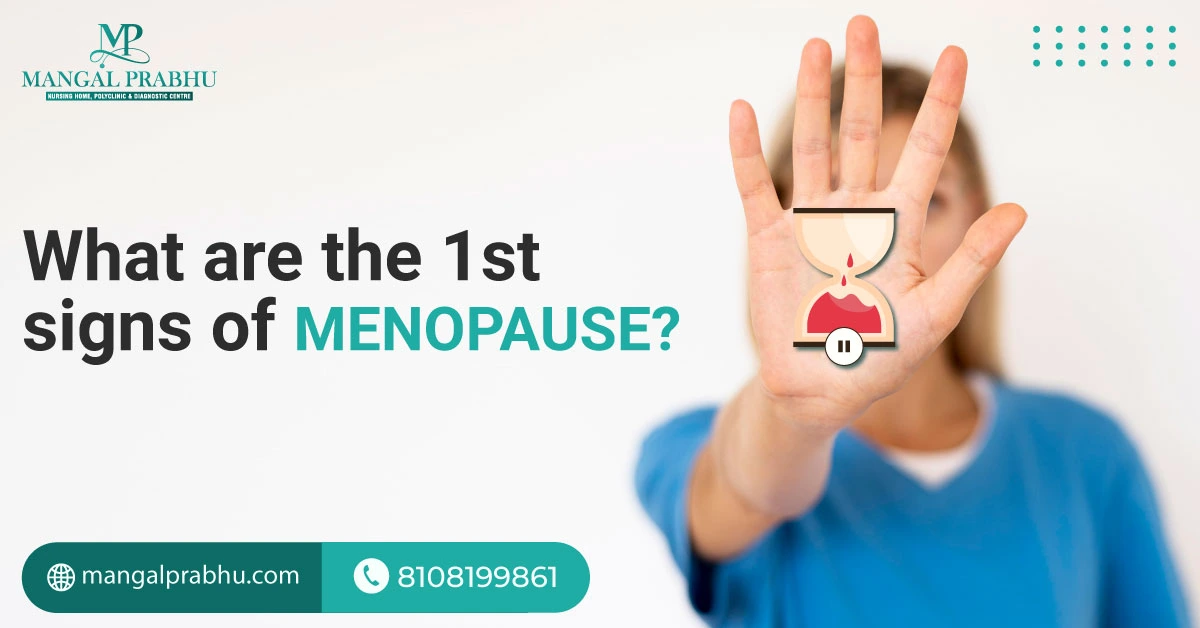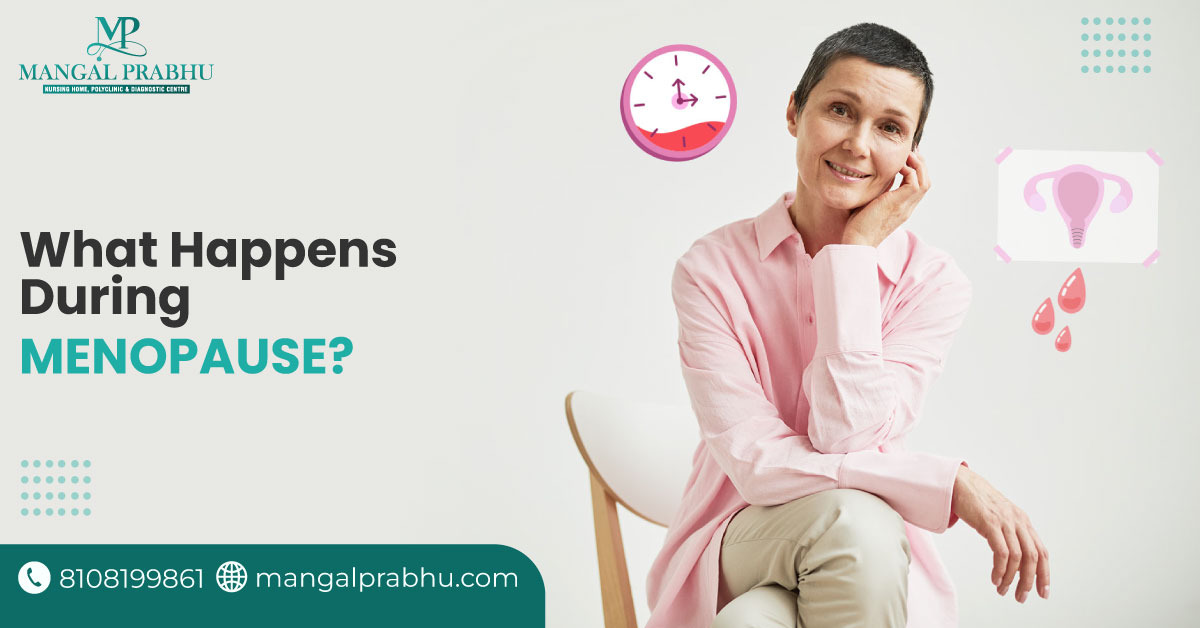
What are the 1st Signs of Menopause?
Menopause is a significant natural change that occurs in a woman’s life in her 40s and 50s. It marks the end of your fertility journey. Once you’ve entered menopause, you will stop having periods. Your ovaries will stop producing estrogen and progesterone — the two vital hormones responsible for your fertility. Menopause happens gradually.
The symptoms can, however, be physically and mentally overwhelming. Knowing what to expect can prepare you for hot flashes, mood swings, and other menopausal symptoms. So, what are the 1st signs of menopause? And when should you see a gynecologist in Navi Mumbai? Let’s find out.
Common Early Symptoms of Menopause
1) Irregular Menstrual Cycles:
The earliest and most obvious sign of menopause is irregular periods. You may have a menstrual cycle one month and skip the next month, or you may go months without periods. The fluctuating period is the biggest sign that menopause is approaching. If there’s a two-month gap between your menstrual cycles, you could already be in your perimenopause. The flow could be heavier or lighter.
2) Hot Flashes:
The sudden onset of hot flashes, which may happen at unexpected times and last a minute or longer, is another early sign of menopause. Night sweats might become more common, and you’ll notice a rapid heartbeat with intense warmth.
3) Emotional Changes:
Menopause can put you on an emotional rollercoaster. One minute, you are happy, and before you know it, you’ll feel sad, anxious, and depressed. A drastic drop in estrogen accompanied by disrupted sleep can be the cause.
Physical Changes
a) Weight Changes:
Low estrogen can shift the fat stored in your thighs and hips to the abdomen. It also affects your metabolism, making it difficult for your body to burn fat. Besides, women in their 40s and 50s tend to exercise less, making weight management difficult.
b) Hair Loss:
Estrogen is again blamed for hair thinning and loss during menopause. Dropped estrogen makes testosterone dominant, which can cause a receding hairline. This male hormone is also responsible for unwanted hair growth on the face, like the chin and upper lip.
Sleep Disruptions
Menopause can disrupt your sleep cycle. Some women sweat a lot at night and might wake up drenched, which can affect their sleep. Other women are unable to fall asleep at all or might wake up frequently throughout the night.
Cognitive and Emotional Effects
Menopause is an emotionally tough time. You experience one of the biggest transitions, from your childbearing age to a new midlife. This can make mood swings frequent. The mood swings can sometimes be so severe that they can turn into depression.
Brain fog is another common symptom that women nearing menopause report. If you’ve been having a hard time concentrating or remembering things, it could be an early sign of menopause.
Importance of Medical Consultation
Whether or not you need menopause treatment in Navi Mumbai depends on the severity of your symptoms. Some women don’t even notice the changes, while others go into depression. If you feel hopeless, helpless, or have lost interest in all activities, consult a gynecologist.

What Happens During Menopause?
What is Menopause?
Menopause marks the end of your menstrual period or the reproductive age. A woman can’t get pregnant after menopause. It happens when you have not had your period for 12 months in a row. There’s no fixed age for menopause, although most women tend to experience it between 45 and 51. It’s a natural aging process. However, the symptoms of menopause, especially during the perimenopause period, can take a toll on your physical and emotional health. It’s important to see a gynecologist in Navi Mumbai if you experience hot flashes, excess bleeding, pelvic pain, and other symptoms.
Common Symptoms of Menopause
Perimenopause is a period where a woman’s body prepares to enter menopause. During this phase, you might experience many physical and emotional symptoms, including:
- Hot flashes
- Sudden urge to urinate
- Inability to hold pee
- Vaginal dryness
- Difficulty sleeping
- Chills
- Weight gain
- Irregular periods
- Heavy bleeding
- Sudden shifts in mood
- Hair thinning
Symptoms can vary for each woman, although irregular periods are quite common in all.
Treatment Options for Menopause
Menopause doesn’t need treatment, but you can consider hormonal therapies and medication to get relief from the symptoms disrupting your life.
i) Hormone Therapy:
The amount of estrogen and progesterone (the two vital reproductive hormones in women) is reduced significantly as you enter menopause. This might cause vaginal dryness and hot flashes. Hormone therapy can restore and balance the levels of these hormones and alleviate the symptoms.
ii) Prescription Medication:
Non-hormonal medications for hot flashes, vaginal dryness, and mood swings can help manage your perimenopause symptoms.
Also Read: What to Expect Before and After Ovarian Cyst Surgery?
Lifestyle Changes to Help Manage Menopause
Menopause treatment in Navi Mumbai is needed if your lifestyle and dietary changes do not produce any results. Here’s what you can try in the meantime.
a) Diet:
Limit caffeine intake and avoid spicy food to manage hot flashes. You should add vitamin-rich foods to your diet to get the required nutrients. Add lentils, chickpeas, grains, soybeans, vegetables, and fruits to your diet.
b) Exercise:
Meditation and Yoga can help you with mental and physical issues with menopause. Regular exercising improves your sleep and reduces anxiety related to menopause.
c) Avoid Triggers:
Certain activities might trigger your symptoms and make them worse. For instance, your weight or smoking habits can worsen your hot flashes. Identify these triggers to manage your symptoms.
Potential Complications and Risks of Menopause
The risk of certain medical issues increases after menopause. You should watch out for the following:
A) Heart Diseases:
A sudden drop in estrogen levels in your body puts you at an increased risk of cardiovascular diseases. Check your cholesterol levels and blood pressure regularly to prevent any heart-related complications.
B) Urinary Incontinence:
You might experience a sudden urge to pee and the inability to hold it. Women after menopause might also experience urine leaks when coughing, sneezing, laughing, etc. Any physical jerk can lead to urge incontinence.
C) Osteoporosis:
Postmenopausal women are at a higher risk of fractures of the hip and knee joints, as their bones become weak.
Lastly, you might experience some discomfort during sexual intercourse because of the vaginal dryness. Speak with your doctor if you experience any of these post-menopausal complications.
